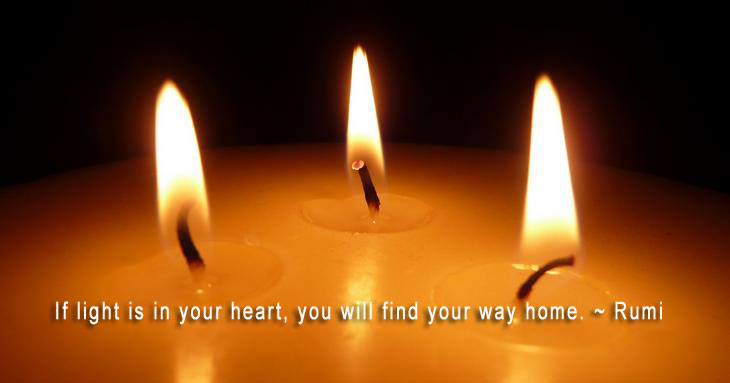It’s a few weeks more before the Diwali celebration and I’m very excited. Known as the Festival of Lights, Diwali has always intrigued me while growing up and with the emergence of the World Wide Web and an introduction to a know-it-all Aunt, I believe that I have truly learnt the significance of Diwali, or so I hope.
Diwali symbolizes the victory of Good over Evil. Oil lamps are lit as a sign of celebration. It disperses light in a quagmire of darkness that mankind has sunk into. It seems to literally say that there is always light at the end of a dark tunnel and so carry on with hope and faith.
The inner Sci-Fi geek in me kept thinking about Star Wars. Could Diwali be very much like the Force’; the omnipresent form of energy which can be used for good, though the dark side lurks in the shadows? Could the force also possibly be the Brahman’ of the Hindu Religion or the Ying and Yang’ of the Taoist philosophy? Hmmmm… Before I get carried away, let’s just stick to it resembling the Force’ for the time being.
The Force
Diwali is celebrated differently throughout India and by the Hindu diaspora abroad. There are various origins attributed to Diwali. Some opine that they celebrate the marriage of Goddess Lakshmi to Lord Vishnu whilst in Bengal; the festival is dedicated to the worship of Kali.
I have also been led to understand that Diwali is dedicated to that blessed day on which the triumphant Lord Rama returned to Ayodhya after defeating the demon king Ravan, this is how it’s universally believed.
However, in Malaysia, it is specifically celebrated as the day the evil demon Narakasura was slain by Lord Krishna, thus the triumph of light over darkness.
The story unravels when after defeating Lord Indra the king of Gods, the demon king Narakasura grabbed the magnificent earrings of Aditi, the mother Goddess and imprisoned sixteen thousand daughters of the Gods and Saints in his harem. Lord Krishna retaliated by killing the demon and releasing the damsels the day before Narakachaturdashi. He also succeeded in recovering the stolen earrings.
Jubilant in victory, Lord Krishna smeared his forehead with the demon king’s blood. When he returned home early on Narakachaturdashi, the womenfolk massaged scented oil on his body and gave him a good bath to wash away accumulated filth.
Thence started the traditional practice of taking a bath before sunrise (ganga-snanam) with oil and uptan – a paste made of gram flour and fragrant powders. Why before sunrise? It is believed that waking up at 4am is a great blessing from the standpoint of health, ethical discipline, efficiency in work and spiritual advancement.
The sages who instituted this custom must have cherished the hope that their descendents would realise its benefits and make it a regular habit in their lives. Today however, considering the time that most of us go to bed, getting up at 4am would deteriorate our health instead. Their way of life may have been different then. With good conquering evil and as balance is brought back to the force, begins…
A New Hope
Just like the ancient Chinese of the 12th century who used fireworks to scare away evil spirits, Indians display fireworks to symbolize the defeat of demons by burning the effigies of either Ravan and his demon brothers or Narakasura.
The firework display is so entwined in the celebration of Diwali that even the poorest of the poor in India would try to buy a few sparklers to dispel the demons that haunt them. It is indeed an endearing symbol of hope.
The festival of Diwali has been celebrated for ages and grows in attraction by the year. Everyone enjoys the goodies, the shine, the glamour and the endless enthusiasm for living that suddenly grips people around this time.
However, there is much more to Diwali than feasting and merrymaking. It’s a time when a small amount of savings is worth spending for some good cause that leads to a long-term positive social or religious benefit for the community as a whole.
The true celebration of Diwali is when we light a lamp in the life of those who are poor and unfortunate or bring some cheer into the heart of an innocent child through acts of kindness and generosity. You could kill a demon that haunts another person’s life and realize that the seed of God (or the ‘force’) is within you.
I was once told that many people believe that Goddess Lakshmi would be truly pleased if we share our wealth and happiness in some meaningful and selfless way, something that sets us apart from the nature of demons (the dark side) who try to use wealth for their own selfish and evil ends.
Wealth is truly divine and remains in its purest divine aspect only when it’s invested for a good cause that promotes the spiritual well being of ourselves and those around us.
Thus, in this chaotic not-so futuristic world, let us therefore celebrate Diwali as an auspicious God sent opportunity to bring cheer, happiness & brotherhood in a world oppressed by the caliginosity of fear, egoism, greed, vanity, famine, sickness, terrorism and selfishness. Let the festival of Diwali bring about unity!
In closing, a Hindu Prayer seems as the best fit:
Asato maa sadgamaya. Tamaso maa jyotirgamaya. Mirtyor maa amritan gamaya. Aum shaanti shaanti shaanti – From the unreal, lead us to the Real; from darkness, lead us unto Light; from death, lead us to Immortality. May peace reign forever.
May the Force be with you, always! And… Happy Diwali to all!
The writer is an aerospace and defence journalist. She is currently based in Jakarta as a freelance writer and can be reached at rosemarie.johnc@gmail.com or visit www.rosemariejohn.com for more information.






